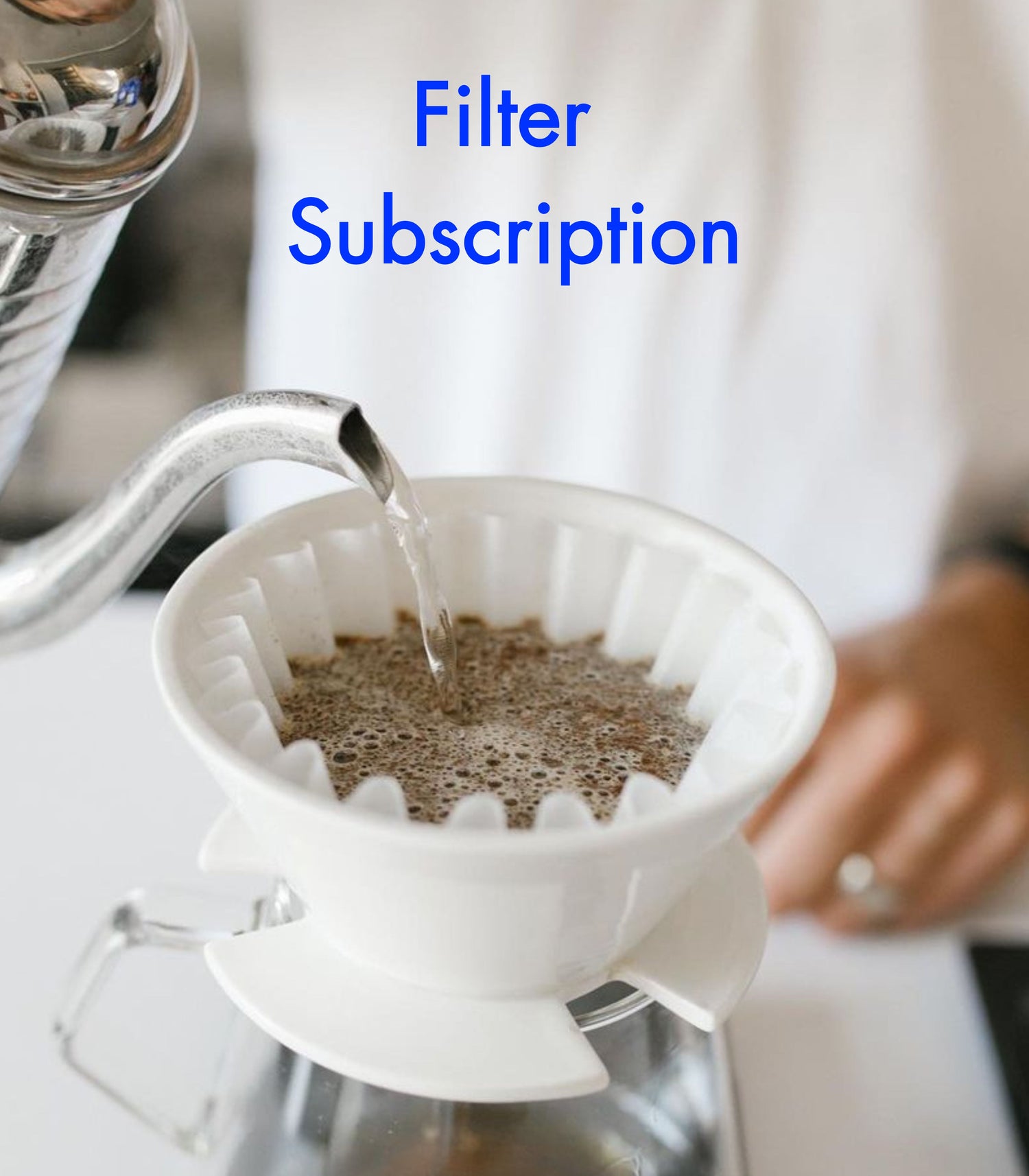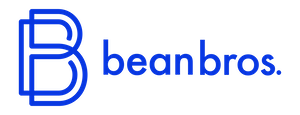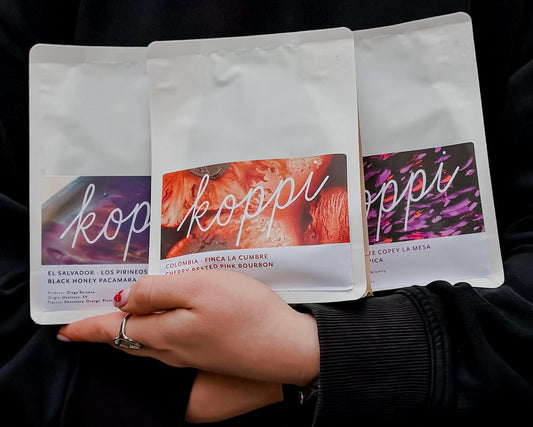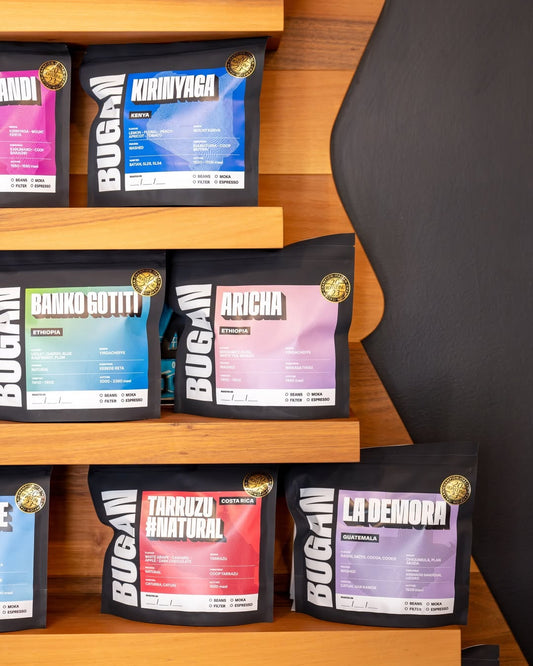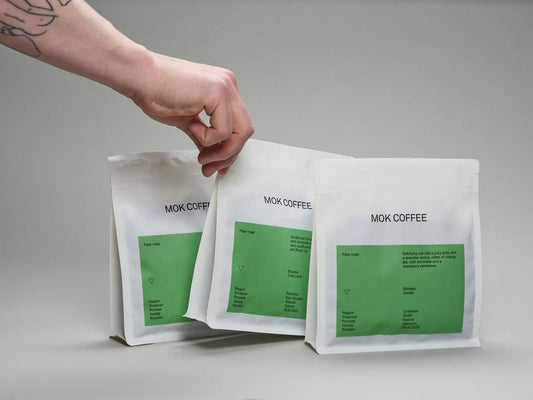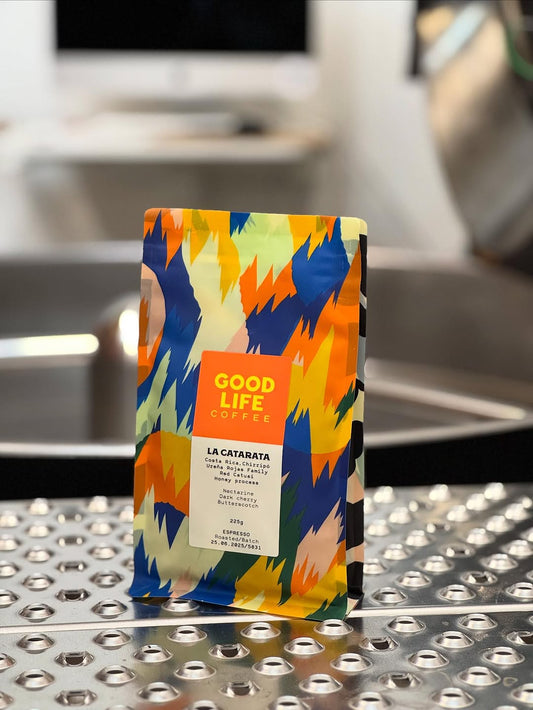This month we bring you coffee from Fuglen. We visited them in Oslo to see both their roasting operation and café. Fuglen is a diverse business operation and provides truly special coffee in memorable and vivid bags!

Joakim is a great example of how you can make dreams a reality if you want something more from your life or you want to make a dream a reality then act on your impulses and live it!
We hope you enjoy your coffee this month and hearing some more from Joakim in our roaster interview.
Who are we talking to and what is your role?
Joakim Pedersen – Managing director and co-owner.
Where did you start in coffee and why?
After working in the animation and VFX industry for several years I realized I was no longer enjoy- ing what I was doing. Parallel to that, I was getting more and more into coffee as a hobby, taking private classes and attending open cuppings where ever available.
In 2013 I quit my job in London and moved back to Norway. I knew I wanted to live in Oslo and to work with coffee, but I had no actual leads. For me at that time coffee + Oslo = Tim Wendelboe, so that was what I was aiming for!
I was really lucky and managed to land an interview with Tim and he offered me a job as roaster and project manager. At the time Tim shared offices with Nordic Approach, and after 8 months I started working for them, and I ended up becoming their main green buyer in Colombia!

What is exciting you on the coffee scene at the moment?
I’m excited by the ever-growing interest in coffee, all the groundbreaking research that is being done, and that the consumers are getting more and more educated, experienced, and knowledgeable.
What inspires you to keep going?
Coffee is extremely complex, with so many layers and perspectives. At the same time coffee is “just coffee”. You can choose to just sit in the boat and enjoy the waves, or you can dive in and explore the endless ocean. I enjoy doing both.
Who makes up the current team and how did you come together?
We’re only two people at the moment, plus a few extra baristas to handle the traffic in the roastery café and help out during production days.
- Joakim Pedersen – head of the roastery. Came from sourcing and sales at Nordic Approach.
- Ludvik Bonna Hopstock – roaster and barista. Was the daytime manager at Fuglen Oslo and always interested in roasting, so when we started the roastery he was the obvious choice.
You have a roastery in Tokyo and a new set up in Oslo – please tell us about these.
The roastery in Tokyo just had their 4th anniversary. They have done a great job, and they’ve been a game changer for the coffee scene in Japan. A lot of things have happened and moved forward in the coffee scene in Tokyo during those four years.
It’s very different challenges the two roasteries face. Fuglen Tokyo has been working in a very new market, where high-end light roast was barely existing when they started up. Here in Oslo, it’s the complete opposite. It’s a very saturated market. There can’t be another city in the world with this many good roasters per capita.
I’m very glad Fuglen is already a well-established quality brand, and that we already have a fantastic and long-running coffee shop. I wouldn’t have started a roastery from scratch in Oslo today.
Tell us some more about your trading process.
We work closely with importers that we know very well. We join them on trips and see how they work with exporters, co-ops, and producers in origin. We demand full transparency from them so that we can give that to our customers as well.
Some origins are easier to work and build relationships in than others, but where possible we are aiming to buy from producers we’ve visited or have bought from previously. Due to Joakim’s background and experience as the main green buyer in Colombia for Nordic Approach, we are doing some direct import from Colombia, working directly with the exporter and the producers.
Whilst the quality of the coffee will always be important and decisive, do you value the relationship first and form that or is the relationship borne from the great coffee?
It’s a combination of both. At the level of quality, we are operating there’s not really any bad coffee. One year can produce an amazing coffee, and the next year it might be slightly lower quality compared to the previous but still great. We do value relationships very high, and where possible we aim to build strong relationships.
In some origins, it’s near impossible for small roasteries like us to be relationship-based, and in those cases, we look more exclusively at the cup quality.
What qualities are important for you in coffee you select to roast and sell?
Clean, transparent, sweet, and as clear taste profile as possible. We’re looking for a variation in taste profiles showcasing the different origins and the variations within.
What changes have you seen within farming communities and wider since you first started working in coffee?
Empowerment of the coffee producer. Many farmers are starting to see the value of their own work and product. They have been in contact with exporters, buyers, and roasters over time, and are realizing that they are sitting on a skill and a product that is worth a certain amount of money. If a farmer invests in new processing methods, varietals, and so on, he is aware that he can demand a higher price for this. This is great! Commercial coffee prices have been the same for more than 30 years, and even though different levels of “specialty coffee” are paying more, coffee is still too cheap.
Do you have any preferred countries of origin for coffee and if so why?
Colombia is close to me because that’s the origin which I’ve spent the most time and I know the most. It’s also an origin with great diversity in flavor profile since coffee is growing in big areas, all year round, and with endless variation in microclimates. Ethiopia is even more complex and varied, and I can’t imagine anyone roasting coffee not having Ethiopia as one their preferred origins!
Tell us about this months coffee.
We follow the seasons to make sure our coffee is always fresh and as tasty as possible. Good planning and working closely with our importing partners are crucial.
The two coffees we selected for Bean Bros this month are definitely representative for our profile.
The Bokasso is a classic Ethiopian from Sidamo. Tea-like and delicate with notes of peach and bergamot. This is one of the coffees we share with the roastery in Tokyo.
The La Claudina is a totally different coffee. It's from the region of Antioquia in the more northern part of Colombia.
It’s a region traditionally most known for more commercial coffee and larger estates, but we are working with a young farmer who has been changing things around. He studied philosophy in Germany, and when he came back to Colombia he decided to changes the philosophy at his fathers’ two farms, and start focusing on quality rather than quantity, and experimenting with different ways of processing, different varietals, and so on.
At first, his father and the surrounding farmers said he was an idiot, but now they realize that this was a good idea, and several of the younger producers in the area have followed in his footsteps. La Claudina is the name of one of his farms, and this lot stood out for us because of it’s thick and jammy mouth-feel, and quite intense fruitiness. It’s very different from our other Colombians which has more floral and tropical notes in the cup.
Article By: Kris Thurbin
